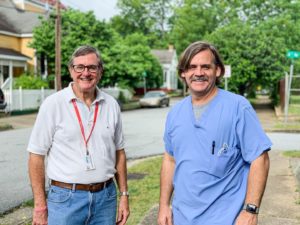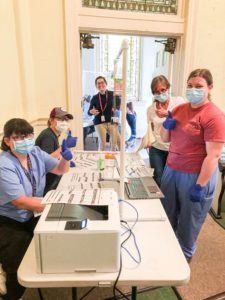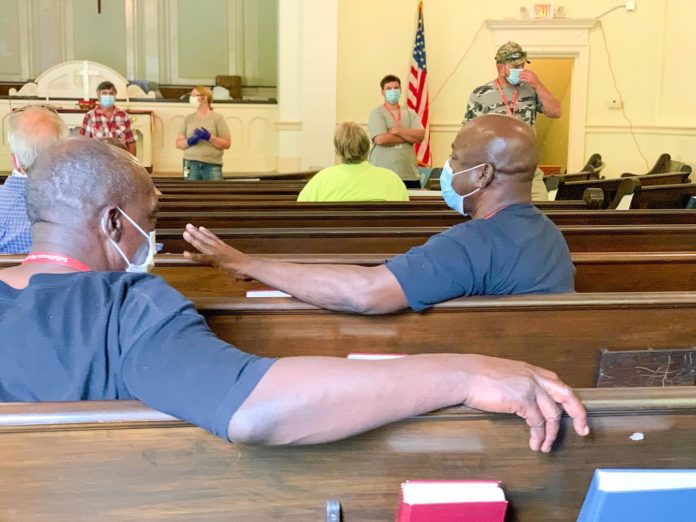Two Mercer University alumni are looking out for a vulnerable population during the COVID-19 pandemic: the homeless.
Together, their two organizations — SafeHouse Ministries and MercyMed of Columbus— have tested hundreds of people living on the streets in Columbus.
During the first round of testing on May 18, nasal swabs were administered to 180 people. Of those, four were positive, and all were asymptomatic, said Heather Franklin, director of development for SafeHouse Ministries and a 2019 graduate of Mercer’s McAfee School of Theology, where she earned a Master of Divinity.
On June 9, they tested an additional 149 people.
“The beauty of it is that we’re able to go to their environment where they feel comfortable, where they’re around people who they know love them already, and so they felt really safe and cared for being tested at their location,” said Dr. Grant Scarborough, founder and executive director of MercyMed, who earned a Doctor of Medicine from Mercer’s School of Medicine in 2003.
MercyMed, a health care center that sees patients with and without insurance, administered the tests at SafeHouse Ministries, which helps homeless, addicted and incarcerated men and women transition back into the community.

For those who tested positive for the virus, SafeHouse Ministries created an isolation unit by sealing off the rotunda of the 1800s-era church in which it operates. The area already had its own heating, ventilation and air conditioning system; restrooms; and entrance, Franklin said.
Those in isolation were retested every seven days. All individuals who tested positive in the first round have since tested negative and come out of isolation. SafeHouse Ministries helped each of them move into some form of housing, including its transitional housing facility called Grace House, Franklin said.
Caring for those who test positive for COVID-19, even if they show no symptoms, is challenging, Dr. Scarborough said.
“It’s a learning minute-by-minute type of deal because there’s so much changing with a pandemic,” he said. “We’ve set up protocols to what to do if they get worse. We set up protocols of when to call an ambulance or if we just call me if they’re just a little bit sick. We have folks committed to checking blood pressures and temperatures daily.
“So we’re able to monitor them pretty closely.”
Each group has its own risks when it comes to the pandemic, and the homeless are no different. When authorities ask people to stay at home, that’s impossible for those without one.
“Among the homeless, they actually are a little bit isolated at nighttime, so I think it protects them a little bit. But then a lot of them gather during the day so they can get food and other things, and so I think that could end up causing more problems,” Dr. Scarborough said. “There’s not really quarantine because they all come together.”
In addition, homeless people may have underlying health conditions they don’t know about, Franklin said.
“We see lots of folks with mental health issues, just general health issues, and so it’s a vulnerable population, generally, if they get sick,” she said.
‘Desire to care for the less fortunate’
Dr. Scarborough founded MercyMed in 2012. Prior to moving to Columbus, he started and ran a clinic for the poor in Augusta.
“Our mission statement says that we exist to proclaim Jesus Christ as Lord and demonstrate his love by providing affordable, quality health care for the physical, emotional and spiritual needs of the underserved,” he said. “I actually went to Mercer because I love its mission of caring for the less fortunate and those who have trouble getting access. …
“So I went to medical school with the desire to care for those who have a hard time getting health care needs met.

Dr. Scarborough has known Franklin for years. She interned with MercyMed as an undergraduate student at Columbus State University and joined SafeHouse Ministries while in seminary at Mercer.
“It’s a partnership that’s been going on for quite a while because our missions are quite similar,” Dr. Scarborough said. “We work ours with medicine and they work theirs through housing and social needs and things like that. But both have the desire to care for the less fortunate with the love of Christ.”
SafeHouse Ministries, which has about two dozen employees, has continued to operate throughout the pandemic, though volunteer programs have stopped.
“Our case management and our two housing facilities continue to operate and house folks, feed folks and take care of them,” Franklin said. “And then we had the increase of opening as an emergency shelter (when another shelter closed).
“We had fewer volunteers to help us, but the demand for our services for the population that we serve continued and/or increased.”
MercyMed adjusted its operations based on what was known about the coronavirus at the time. Now its providers see about half of their patients via telemedicine and half in the clinic, Dr. Scarborough said.
MercyMed a testing leader in Columbus
Early into the pandemic, Dr. Scarborough reached out to the Columbus Health Department to find out how he could help.
Public health officials said they needed testing, so he found a lab, and MercyMed tested 1,240 people throughout the Columbus community. Of those, 15% were positive, he said.
Of the 184 positive cases, MercyMed ended up following 140 people for two weeks and monitoring their response.
“We actually built out part of our clinic into basically a bubble — all plastic walls and plastic ceilings — and I saw 104 patients in the bubble,” Dr. Scarborough said. “The other ones weren’t really sick enough to have to come in, and we had med students and nurses call them every day for 14 days just to check on them.”
“I think the greatest support was all the wraparound services, knowing someone’s calling them, knowing they could connect with one another, and all 140 that we followed all got better.”
Dr. Grant Scarborough
MercyMed had a team for prayer requests and a team that handed out over 100 masks, thermometers and food. There also was a video call twice a week for people who tested positive for COVID-19 to talk with each other, and a chaplain was available for counseling.
“We had this physical stuff, where you came and saw a doctor. We saw you day one and day 10. And, honestly, we didn’t do very much there,” Dr. Scarborough said. “I think the greatest support was all the wraparound services, knowing someone’s calling them, knowing they could connect with one another, and all 140 that we followed all got better.”
Dr. Scarborough is the internal medicine clerkship director for the School of Medicine’s Columbus campus. Students rotated with him during the mass COVID-19 screening and helped call patients. They asked patients about how they were doing, their temperature, their pulse ox (a measurement of how much oxygen is in the blood), certain symptoms, and if they had any social needs, like speaking to a chaplain.
“Literally all you heard back then was everybody’s dying … and it caused so much anxiety,” Dr. Scarborough said. “And so many folks said, ‘If it wasn’t for the fact that I knew the student was calling me back, I don’t know how I would have made it.’”
As of June 9, Muscogee County, where Columbus is located, had 868 confirmed COVID-19 cases, resulting in 122 hospitalizations and 22 deaths, according to the Georgia Department of Public Health’s COVID-19 Daily Status Report.
‘We can’t let fear hold us back’
Both Dr. Scarborough and Franklin have a passion for faith-based service.
“I wanted to start serving the poor because I think you can’t look at the Bible without realizing that God has a heart for the less fortunate. It’s all dripping down every page in the scripture,” Dr. Scarborough said. “And I think as people who love a God who loves the poor, we need to live in that same type of manner.”
He and Franklin said their faith helped them serve the community while facing the fear of the COVID-19 crisis.
“There needs to be some wisdom of what we’re doing, but we can’t let fear hold us back,” Dr. Scarborough said.
That means taking all precautions to mitigate spread of the coronavirus while also knowing God is with them.
“God is in control, and he loves me, and because of that, I can reach out to others.” he said.









